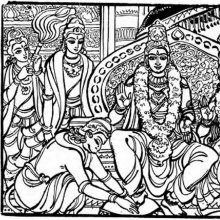Conceit: 2 definitions
Introduction:
Conceit means something in Hinduism, Sanskrit, Jainism, Prakrit. If you want to know the exact meaning, history, etymology or English translation of this term then check out the descriptions on this page. Add your comment or reference to a book if you want to contribute to this summary article.
Images (photo gallery)
In Hinduism
Yoga (school of philosophy)
Source: ORA: Amanaska (king of all yogas): A Critical Edition and Annotated Translation by Jason BirchConceit is denoted by the Sanskrit term Darpa, according to the Amanaska Yoga treatise dealing with meditation, absorption, yogic powers and liberation.—Accordingly, as Īśvara says to Vāmadeva: “[...] Some have intellects which have become insensitive through reasoning and [philosophical] speculations, [and some] are elevated by [their] conceit (darpa) and ego. Some are self-satisfied with pride, [rendered] stupid by [their obsession with] caste, and [some] are confounded by activities such as meditation. Generally speaking, the multitudes of people have deluded minds and various [mental] disturbances, for, those who experience nothing but the bliss of the undisturbed, natural [no-mind] state, are not seen in the world. [...]”.

Yoga is originally considered a branch of Hindu philosophy (astika), but both ancient and modern Yoga combine the physical, mental and spiritual. Yoga teaches various physical techniques also known as āsanas (postures), used for various purposes (eg., meditation, contemplation, relaxation).
In Jainism
General definition (in Jainism)
Source: academia.edu: Tessitori Collection IConceit refers to one of the “thirteen difficulties”, according to the “Teraha kāṭhīyā-svādhyāya” by Jinaharṣa (dealing with the Ethics section of Jain Canonical literature), which is included in the collection of manuscripts at the ‘Vincenzo Joppi’ library, collected by Luigi Pio Tessitori during his visit to Rajasthan between 1914 and 1919.—The exposition of the ‘thirteen difficulties’ [e.g., conceit (thambha or māna)] against which one should fight as they are hindrances to proper religious practice is a widespread topic in Jain literature in Gujarati.

Jainism is an Indian religion of Dharma whose doctrine revolves around harmlessness (ahimsa) towards every living being. The two major branches (Digambara and Svetambara) of Jainism stimulate self-control (or, shramana, ‘self-reliance’) and spiritual development through a path of peace for the soul to progess to the ultimate goal.
See also (Relevant definitions)
Ends with: Equality Conceit, Inferiority Conceit, Superiority Conceit.
Full-text (+503): Mana, Atimana, Abhimana, Khaya, Ahamkara, Majuraki, Badamasti, Badamasta, Anahamkara, Phurakatanem, Majora, Darparambha, Managranthi, Vicalana, Unmada, Phulaji, Patraja, Modashi, Atopa, Mada.
Relevant text
Search found 170 books and stories containing Conceit; (plurals include: Conceits). You can also click to the full overview containing English textual excerpts. Below are direct links for the most relevant articles:
The View From the Center (by Ajahn Amaro)
Shishupala-vadha (Study) (by Shila Chakraborty)
Citrakāvya in the Śiśupālavadha (Introduction) < [Introduction]
Consultation and Pañcāṅga-mantra < [Chapter 1 - Concept of Vijigīṣu king]
Ṣāḍguṇya in the Śiśupālavadha < [Chapter 3 - Six fold policies of a king (Ṣāḍguṇya)]
Cetasikas (by Nina van Gorkom)
Chapter 17 - Conceit < [Part III - Akusala Cetasikas]
Appendix 7 - Appendix To Chapter 20 < [Appendix And Glossary]
Chapter 23 - Different Groups Of Defilements Part III < [Part III - Akusala Cetasikas]
Abhidhamma in Daily Life (by Ashin Janakabhivamsa) (by Ashin Janakabhivamsa)
Factor 7 - Mana (conceit) < [Chapter 2 - On akusala cetasikas (unwholesome mental factors)]
Chapter 2 - On akusala cetasikas (unwholesome mental factors)
Factor 2 - Ahirika (moral shamelessness) < [Chapter 2 - On akusala cetasikas (unwholesome mental factors)]
Visuddhimagga (the pah of purification) (by Ñāṇamoli Bhikkhu)
The Immaterial Septad < [Chapter XX - Purification by Knowledge and Vision of the Path and the Not-path]
(10) Recollection of Peace < [Chapter VIII - Other Recollections as Meditation Subjects]
II. The States Associated with the Path, etc. < [Chapter XXII - Purification by Knowledge and Vision (ñāṇadassana-visuddhi-niddesa)]
Listening to the Dhamma (by Nina van Gorkom)
